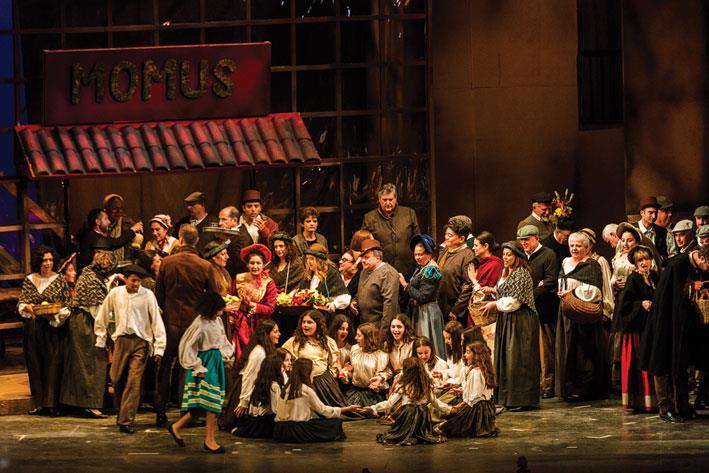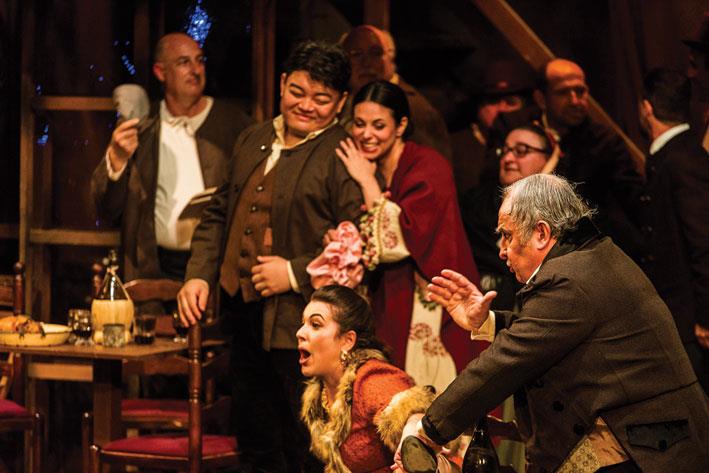Since 23 March, Gaulitana: A Festival of Music has been guiding audiences through a series of nearly daily chamber music concerts, culminating in the staging of one of the most beloved operas in the repertoire, Giacomo Puccini's La Bohème.
I have always thought that the proof of a great work of art is the fact that no matter how many times one goes back to it, it never loses its allure. La Bohème is a prime example of such a work. With each viewing of a high-quality production, I discover new riches that I had previously taken for granted. Throughout Gaulitana's opera production on Saturday, my attention was consistently drawn to the way that Puccini uses the same musical themes or variations in different parts of the opera. Yet, when placed in distinct orchestral settings and dramatic contexts, these elements convey varying messages to the listener. All the lovely arias were there, but that was not all - the feeling was not just in the melodies but more so in the score. This, I believe, speaks volumes about the performance of the Malta Philharmonic Orchestra, guided by the sensitive and energetic direction of Colin Attard.

This performance was thoroughly enjoyable with all the elements - visual, vocal and instrumental - harmonising seamlessly. As the plot unfolded and music passed through a variety of emotions, from the festive cheer of Parisian Christmas celebrations to the heart-wrenching death of the protagonist and the sorrow of all her friends, the audience was deeply moved.
After recently attending a production of the opera in Berlin, where the opening scene was lively and spirited, this performance initially seemed somewhat subdued to me. However, my perception quickly changed upon the arrival of Schaunard, the musician portrayed by bass Constantino Finucci, who injected energy into the scene.
At this point the scene came to life and the comedy kept rising to climax in the landlord scene. The departure of the friends for the revelry of the Cafe Momus leaving Rodolfo, the poet (tenor David Junghoon Kim) alone, leads to one of the most beautiful love duets ever written following the entrance of Mimi (soprano Federica Vitali). It is love at first sight for the couple and Puccini gives them two of the most beautiful arias ever written: Mi chiamano Mimi and Che Gelida Manina. Junghoon Kim has a fine voice but he has some problems with his diction (thank God for the surtitles in this context) and his singing does not have the same expressive quality of the soprano. Mimi came out as being more of a poet than him.

During the lively second act at the Cafe Momus, the festivities were graced by the presence of a prelate who joined the people - children, vendors, musicians and everyday citizens. Everybody was having so much fun. The stage might have been overcrowded but the artistic director, Enrico Castiglione, made sure that the main characters were never engulfed by the crowd. At this point Musetta comes in. I had been looking forward to soprano Nicola Said's performance and I was in no way disappointed. The rich texture of her voice and her vibrant personality were a marked contrast to the sensitive Mimi. But we really see what lies beyond the surface of Musetta in the last act when after giving Marcello (baritone Yuriy Yurchuk) her earrings to pawn in order to get medicine for Mimi, she very sensitively decides that the money should fulfil Mimi's last desire and get her a warm muff for her hands. Even Mimi recognises that beneath Musetta's carefree ways there was real goodness.
With Act III the mood changes completely. The cold winter morning is nothing but a reflection of the coldness that has caught up with the main protagonists. Mimi is worried about Rodolfo's jealousy, but this is not the real thorn in Rodolfo's heart: Mimi is ill and he lacks the means to have her cured. So the two decide to part - at least until the spring, they hope, the re-birth of life. Once again in this act the vibrancy of the couple, Musetta and Marcello, acts as a foil to the submissive Mimi and Rodolfo - a contrast that was beautifully expressed in the quartet close to the end of the act.
Act IV reminds us that the four friends are still finding it difficult to make ends meet but they are young and still determined to get as much as they can out of their lives: but only until Musetta enters to announce that having reached her deathbed Mimi has decided to come back to Rodolfo. Henceforth, the music and drama are a roller-coaster of emotions - all are concerned, all are suffering - they are all one. The poignant moment when Colline (Romano dal Zovo) bids farewell to his coat, which he's held onto for so long, in order to raise funds for Mimi, was deeply touching. The best that the friends can do is to leave the two lovers on their own. The music keeps building up right to Rodolfo's final anguished cry of Mimi.
An opera like La Boheme needs a realistic stage-set and Castiglione's sets struck the right note. Although they were visually appealing and effectively reflected the unfolding drama, they never overshadowed the main focus. The result was subtle but effective.
Congratulations also go to the minor characters, the chorus and the extras, all of whom contributed to this successful production.
